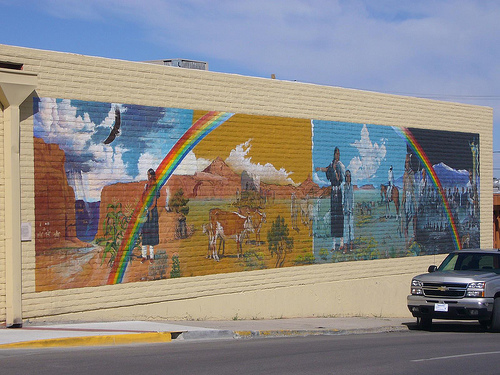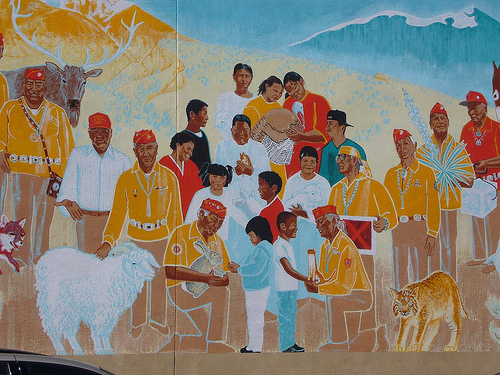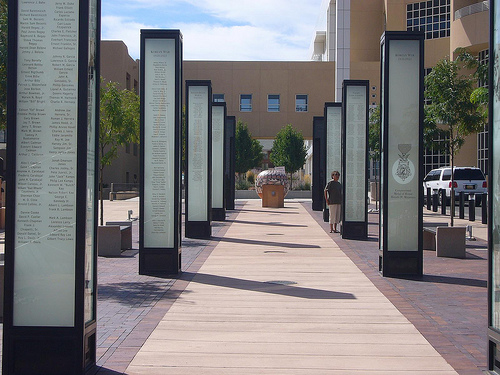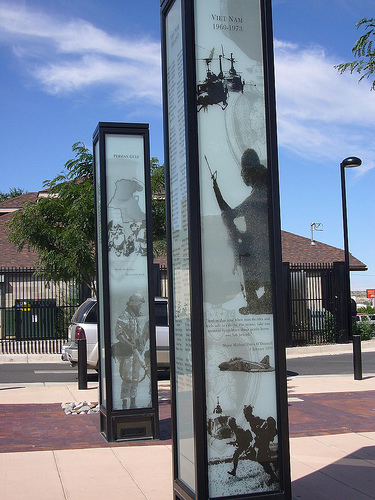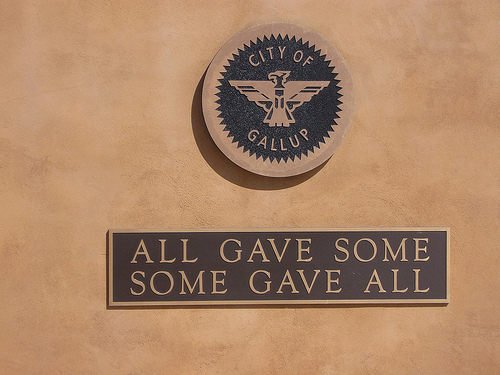One of our favorite places in New Mexico is Gallup, a former frontier town founded in 1881 on Historic Route 66. We’ve visited there about four times now and we’ve learned some historic facts along the way. Fact one: Gallup has the highest annual number of DWIs per capita of any town anywhere, period. It is situated next to the Navajo Nation Reservation and as such reflects an unfortunate aspect of Native American reality, namely, alcohol abuse. Fact one, Part two: Take away a people’s land and attempt to eradicate their culture and they tend to look into a bottle for answers. Fact one, Part two, Russian version: Make them wait on line three hours in the cold for a loaf of bread and they’ll need vodka.
Birth Fact: The town did not get its name from anything to do with horses. Rather, in the 1880s when the railroad was being built through the coal-mining areas of western New Mexico, paymaster David Gallup was stationed where the town is now so railroad workers talked of “going to Gallup” to be paid. Towns tend to spring up where the money is and the new railroad didn’t hurt so Gallup was born.
Commerce Fact: Because of its proximity to the Navajo and Zuni reservations and the establishment of the trading post system, 85% of the world’s supply of Native American-made crafts passes through the businesses of Gallup today. The most exquisite turquoise and silver jewelry as well as traditional pottery and handmade Navajo rugs are available everywhere, even sold table-to-table by local Native Americans in restaurants while you eat. If you choose not to be approached by local artisans during your meal, you just pick up a “No Sale Please” card when you enter and place it on your table.
Our biggest education by far was regarding pawn. The concept of pawn in old New Mexico was completely unlike the stigmatized down-on-your-luck version found everywhere today. In frontier times, pawn rooms were part of the trading posts and they served as banks. Native Americans needed to buy raw materials for their craft work so they would leave a handmade item for a loan that they would pay back from future sales and reclaim their pawned item.
That system is still in place today with pawn shops crowded on payday as locals head in to pay off their pawn or put something toward what they owe. Others wait in line with items to leave for cash so they can make their bills or pay off other debts. Still others utilize pawn shops as vaults for their valuables since theft runs as high on the reservation as it does in your hometown. Some of the most rare and beautiful things made by Native Americans can be found in the dead pawn section which consists of those items never retrieved by their owners.
Gallup always surprises us and this visit was no exception. The city commissioned local artists to create murals depicting Native American history and culture and the resulting artworks made us catch our breath as we came upon them sprawled across public buildings. But it was the newly erected war memorial to the soldiers of Gallup that stopped my heart.
In a plaza next to the adobe-style courthouse, glass-sided square pillars about twenty feet in height lined a walkway facing a bronze plaque. Each pillar memorialized a different war beginning with the Spanish American War of 1898 through the Persian Gulf. One side of each pillar listed POWs and MIAs; another had the names of those killed in action; a third side listed those who returned as veterans and all sides contained many Native American names.
The fourth side of each pillar told of the war itself and the particular quote chosen shrewdly captured the essence of remembered sentiment:
For the Navajo Code Talkers of WWII:
“If it were not for the Navajos, the Marines would never have taken Iwo Jima.” – Maj. Howard Conner
For the Bataan Death March, 1942-1945
“We’re the battling bastards of Bataan
No mama, no papa, no Uncle Sam
No aunts, no uncles, no cousins, no nieces
No pills, no planes, no artillery pieces
. . . and nobody gives a damn.
We’re the battling bastards of Bataan.”
For Vietnam:
“And in that time when man decides and feels safe to call the war insane, take one moment to embrace those gentle heroes you left behind.” – Maj. Michael Davis O’Donnell
For the Persian Gulf:
“We will rule the night. . .” – Gen. Colin Powell
And for whatever is going on now, whether we’re calling it The War on Terror, The War in Iraq or Gulf Continued, there is a twenty-foot glass-sided pillar blank and waiting. And that’s what broke my heart.
Snapshots in time, downtown Gallup, New Mexico

